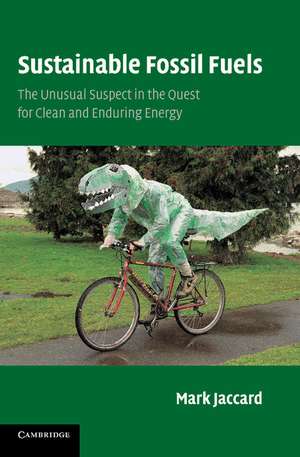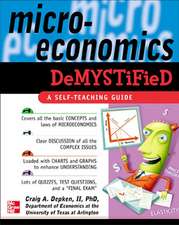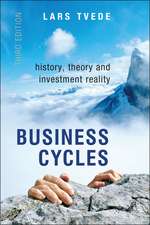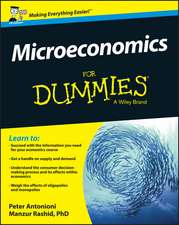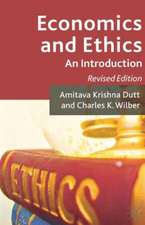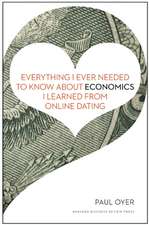Sustainable Fossil Fuels: The Unusual Suspect in the Quest for Clean and Enduring Energy
Autor Mark Jaccarden Limba Engleză Paperback – 15 ian 2006
Preț: 297.58 lei
Nou
Puncte Express: 446
Preț estimativ în valută:
56.94€ • 60.89$ • 47.48£
56.94€ • 60.89$ • 47.48£
Carte tipărită la comandă
Livrare economică 18 aprilie-02 mai
Preluare comenzi: 021 569.72.76
Specificații
ISBN-13: 9780521679794
ISBN-10: 0521679796
Pagini: 398
Ilustrații: 9 tables
Dimensiuni: 152 x 229 x 22 mm
Greutate: 0.54 kg
Ediția:New.
Editura: Cambridge University Press
Colecția Cambridge University Press
Locul publicării:Cambridge, United Kingdom
ISBN-10: 0521679796
Pagini: 398
Ilustrații: 9 tables
Dimensiuni: 152 x 229 x 22 mm
Greutate: 0.54 kg
Ediția:New.
Editura: Cambridge University Press
Colecția Cambridge University Press
Locul publicării:Cambridge, United Kingdom
Cuprins
Figures; Tables; Acknowledgements; 1. What is energy sustainability; 2. Is our current energy path sustainable?; 3. The prospects for clean secondary energy; 4. The usual suspects: efficiency, nuclear and renewables; 5. The unusual suspect: how long can fossil fuels last - and does it matter?; 6. Can we use fossil fuels cleanly - and what might it cost?; 7. Sustainable energy trade-offs: evaluating the alternatives; 8. Sustainable energy policy - how do we get there?; 9. Broadening the definition: is sustainable energy sustainable?; Index.
Recenzii
'Jaccard's well-researched study injects a much-needed dose of reality into the discussion of a 'sustainable' energy system. It is the voice of the economist tempered by extensive practical experience in the field and an evident concern for the future of our environment.' Jake Jacoby, Professor of Management at MIT and Co-Director of the MIT Joint Program on the Science and Policy of Global Change
'Mark Jaccard tackles the two key global energy problems, an apparent shortage of oil and a dangerous build up of CO2 in the atmosphere, and presents an original perspective on how simultaneously to resolve them with such clarity that it appears obvious - after you have read the book!' Jon Gibbins, Energy Technology for Sustainable Development Group, Mechanical Engineering Department, Imperial College London
'Mark Jaccard skillfully makes the case that those who leave modifying the way we use fossil fuels out of any plan to achieve 'sustainability' in our energy systems surely confuse means with ends. If our objectives are to improve energy security and protect the environment at reasonable cost, he makes clear that, with a little bit of ingenuity and resolve, our extensive fossil fuel resources could well be our best friend rather than our worst enemy.' John Weyant, Department of Management Science and Engineering, Stanford University
'Discussions of energy options too often over simplify the world into good guys and bad guys. In his latest book, Mark Jaccard has done us all a service. He has brought cool analysis and common sense to a complex area of public policy fraught with myth and image management. His objective is to consider what might constitute a more sustainable energy system and in this he considers not only the usual suspects (energy efficiency, nuclear and renewables) but the unusual - fossil fuels. In doing so, he moves beyond the simplistic rhetoric and offers us practical policy recommendations that deserve serious consideration.' Milton Catelin, Chief Executive, World Coal Institute
'Does preventing global warming require an end to fossil fuels? Jaccard makes a strong case that significant fossil fuel use and climate protection can co-exist, without harming economic growth. Read the book and decide for yourself.' David Hawkins, Director, Climate Center, Natural Resources Defense Council
'Jaccard's book offers an important perspective on the major challenges posed by conventional energy. CO2 emissions from fossil fuel burning must be curbed and oil dependence must be reduced to address climate-change and oil-supply-insecurity concerns. Many understand that this implies making energy use more efficient and increasing renewable energy roles. But few realize that fossil energy technologies can be modified at relatively low incremental costs to help address these concerns with CO2 capture and storage technologies. This book addresses this issue. It is a marvelous primer showing why this option must be taken seriously by policymakers and the general public.' Robert Williams, Senior Research Scientist, Princeton Environmental Institute, Princeton University
'Mark Jaccard's analysis of the potential contribution of fossil fuels provides a much-needed contrast to the more extreme views of imminent resource exhaustion.' G. Campbell Watkins, co-editor of The Energy Journal
'This is an optimistic book. It significantly broadens energy perspectives. In the general discourse, energy is often associated with serious challenges: security of supply, peace, climate change, many other environmental issues, and the unfilled needs of energy services for economic growth and poverty alleviation for a majority of the world's population. This book presents new technically and economically feasible options that promise to address these challenges. There is light in the tunnel, and it is now up to all stakeholders, and our political processes, to realize these options! I strongly recommend this book to all concerned about our common future!.' Thomas Johansson, Professor and Director, International Institute for Industrial Environmental Economics, Lund University
'Make no mistake. Mark Jaccard's Sustainable Fossil Fuels is a beacon for rational decision-making in 21st century. Buy it and read it. It could change your world forever.' The Globe and Mail
'Accessible to non-academics, this book is a description of what our energuy requirements are likely to be, not what they ought to be. Throughout we are reminded that much will depend on our collective need to respect the physical strain the planet may come under.' Resource
'… a pleasure to read …' Journal of Industrial Ecology
'Mark Jaccard tackles the two key global energy problems, an apparent shortage of oil and a dangerous build up of CO2 in the atmosphere, and presents an original perspective on how simultaneously to resolve them with such clarity that it appears obvious - after you have read the book!' Jon Gibbins, Energy Technology for Sustainable Development Group, Mechanical Engineering Department, Imperial College London
'Mark Jaccard skillfully makes the case that those who leave modifying the way we use fossil fuels out of any plan to achieve 'sustainability' in our energy systems surely confuse means with ends. If our objectives are to improve energy security and protect the environment at reasonable cost, he makes clear that, with a little bit of ingenuity and resolve, our extensive fossil fuel resources could well be our best friend rather than our worst enemy.' John Weyant, Department of Management Science and Engineering, Stanford University
'Discussions of energy options too often over simplify the world into good guys and bad guys. In his latest book, Mark Jaccard has done us all a service. He has brought cool analysis and common sense to a complex area of public policy fraught with myth and image management. His objective is to consider what might constitute a more sustainable energy system and in this he considers not only the usual suspects (energy efficiency, nuclear and renewables) but the unusual - fossil fuels. In doing so, he moves beyond the simplistic rhetoric and offers us practical policy recommendations that deserve serious consideration.' Milton Catelin, Chief Executive, World Coal Institute
'Does preventing global warming require an end to fossil fuels? Jaccard makes a strong case that significant fossil fuel use and climate protection can co-exist, without harming economic growth. Read the book and decide for yourself.' David Hawkins, Director, Climate Center, Natural Resources Defense Council
'Jaccard's book offers an important perspective on the major challenges posed by conventional energy. CO2 emissions from fossil fuel burning must be curbed and oil dependence must be reduced to address climate-change and oil-supply-insecurity concerns. Many understand that this implies making energy use more efficient and increasing renewable energy roles. But few realize that fossil energy technologies can be modified at relatively low incremental costs to help address these concerns with CO2 capture and storage technologies. This book addresses this issue. It is a marvelous primer showing why this option must be taken seriously by policymakers and the general public.' Robert Williams, Senior Research Scientist, Princeton Environmental Institute, Princeton University
'Mark Jaccard's analysis of the potential contribution of fossil fuels provides a much-needed contrast to the more extreme views of imminent resource exhaustion.' G. Campbell Watkins, co-editor of The Energy Journal
'This is an optimistic book. It significantly broadens energy perspectives. In the general discourse, energy is often associated with serious challenges: security of supply, peace, climate change, many other environmental issues, and the unfilled needs of energy services for economic growth and poverty alleviation for a majority of the world's population. This book presents new technically and economically feasible options that promise to address these challenges. There is light in the tunnel, and it is now up to all stakeholders, and our political processes, to realize these options! I strongly recommend this book to all concerned about our common future!.' Thomas Johansson, Professor and Director, International Institute for Industrial Environmental Economics, Lund University
'Make no mistake. Mark Jaccard's Sustainable Fossil Fuels is a beacon for rational decision-making in 21st century. Buy it and read it. It could change your world forever.' The Globe and Mail
'Accessible to non-academics, this book is a description of what our energuy requirements are likely to be, not what they ought to be. Throughout we are reminded that much will depend on our collective need to respect the physical strain the planet may come under.' Resource
'… a pleasure to read …' Journal of Industrial Ecology
Notă biografică
Descriere
This 2006 book controversially argues that fossil fuels will play a key role in a sustainable energy system.
